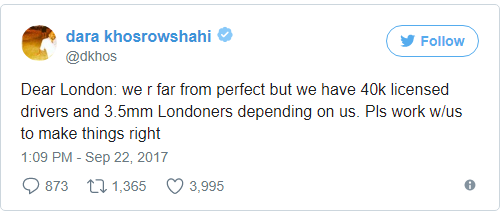Uber’s new CEO, Dara Khosrowshahi, did not step into an easy role–taking over a company that recently experienced several major scandals in a single tumultuous year.
To add to Khosrowshahi’s list of grievances, on Friday London’s transport authority announced that it would not be renewing Uber’s license to operate in the city. Transport for London (TfL) cited that Uber’s “approach and conduct demonstrate a lack of corporate responsibility in relation to the number of issues which have potential public safety and security implications.”
In the Evening Standard, The new CEO published a letter taking responsibility and apologizing for the company’s mistakes. “While Uber has revolutionised the way people move in cities around the world, it’s equally true that we’ve got things wrong along the way. On behalf of everyone at Uber globally, I apologise for the mistakes we’ve made,” Khosrowshahi wrote
Additionally, he Tweeted:

Most refreshingly respectable was Khosrowshahi’s email to Uber employees, where he stated:
While the impulse may be to say that this is unfair, one of the lessons I’ve learned over time is that change comes from self-reflection. So it’s worth examining how we got here. The truth is that there is a high cost to a bad reputation. Irrespective of whether we did everything that is being said about us in London today (and to be clear, I don’t think we did), it really matters what people think of us, especially in a global business like ours, where actions in one part of the world can have serious consequences in another.
In this letter, Khosrowshahi teaches employees a huge lesson in leadership and emotional intelligence. “A lesser-skilled leader may have seen the London transportation authority’s decision as unfair, insulting, maybe even a direct attack on innovation itself. (In fact, previous actions by Uber seem to flaunt the positions of regulatory authorities.),” an Inc. article points out.
While Khosrowshahi clearly expressed his disagreement with LfT’s decision, he also demonstrated the ability to learn from different perspectives and negative feedback.
The LfT’s choice to disengage with Uber represents a trend in global business, where companies are being held accountable for not only the way they conduct business, but also their HR practices, culture, and standard of ethics. As Khosrowshahi says, in the global marketplace, “it really matters what people think of us…actions in one part of the world can have serious consequences in another.”
In resisting the temptation to focus on right or wrong, Khosrowshahi helps Uber employees look at the big picture and to understand how perceptions differ, bringing in a fresh sense of maturity and leadership wisdom to the company.
